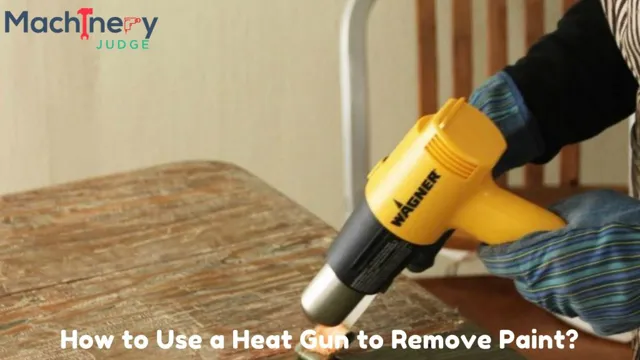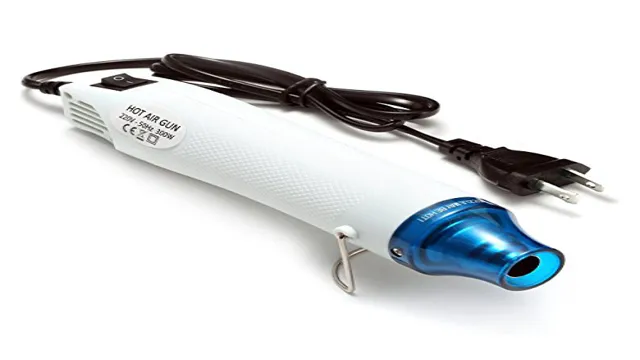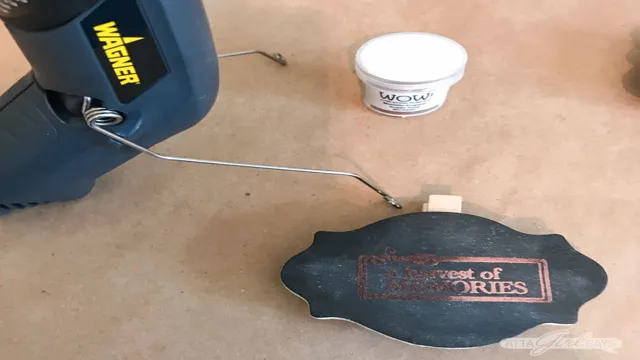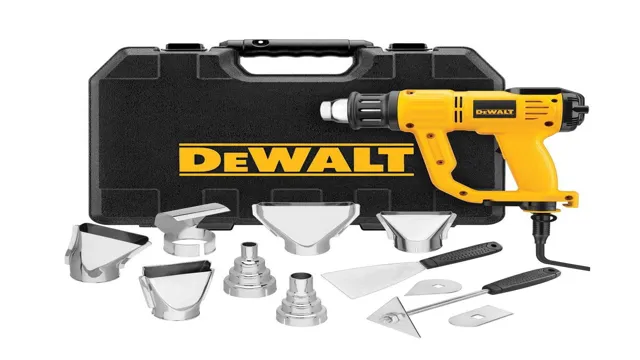Does a heat gun work on resin? A Comprehensive Guide to using Heat gun for Resin Art

Have you ever wondered if a heat gun can be used on resin? Maybe you’re an avid crafter or DIY enthusiast, looking for new ways to work with this popular material. Or perhaps you’re a beginner who’s just starting to explore the world of resin art. Whatever your experience level, understanding how to use a heat gun safely and effectively can be a game-changer.
In this post, we’ll dive into the nitty-gritty of resin and heat guns, covering everything from the basics to the advanced techniques. So grab your favorite beverage and let’s get started!
What is Resin?
If you’re wondering whether a heat gun works on resin, the answer is yes – but it depends on the type of resin you’re working with. Resin is a type of material that’s commonly used in arts and crafts, jewelry making, and other DIY projects. It typically comes in two types: epoxy resin and polyester resin.
Both types can be hardened by applying heat, but the specifics vary based on the type of resin. With epoxy resin, you can use a heat gun to speed up the curing process and to remove any bubbles that may have formed. However, with polyester resin, a heat gun can cause the resin to set up too quickly, making it difficult to work with.
In general, when using a heat gun on resin, it’s important to be patient and to monitor the process carefully to avoid damaging your project. With the right approach, though, a heat gun can be a valuable tool when working with resin.
Definition and Types of Resin
Resin is a versatile and fascinating material widely used in numerous industries, including construction, art, and automotive. It is a natural or synthetic compound that hardens when subjected to heat, air, or chemicals. The term “resin” is derived from the Latin word resina, which means “sticky substance.
” Resins can be classified into two main types: natural and synthetic. Natural resins are produced by plants and animals, and they include substances such as gum Arabic, amber, and shellac. Synthetic resins are produced artificially through chemical processes, and they include epoxy, polyester, and acrylic resins.
Both types are used for different purposes, and each has unique properties that make it suitable for specific applications. Resins are insoluble in water but can dissolve in some organic solvents, which makes them ideal for use in coatings, adhesives, and composite materials. Overall, resin is an incredibly versatile material that has revolutionized many industries and will continue to do so in the future.

How Does a Heat Gun Work?
Have you ever wondered how a heat gun works on resin? Heat guns are versatile tools that use hot air to soften or melt a variety of materials, including resin. When you aim a heat gun at resin, the nozzle releases hot air at a high temperature, usually between 100 and 550°C, depending on the heat gun’s setting. The resin begins to soften and melt as the heat penetrates its surface and breaks down its molecular structure.
However, the trick is to apply the heat evenly across the resin’s surface, or it may crack or burn in some areas. Additionally, you need to control the temperature carefully, as excessive heat can cause the resin to become brittle or lose its shape altogether. Overall, using a heat gun on resin requires skill and patience, but it can be a useful tool for achieving a smooth and even finish for your DIY projects.
Explanation of Heat Gun Functionality
A heat gun is a versatile tool that is often used in crafting, DIY projects, and even automotive repairs. But how exactly does it work? Essentially, a heat gun uses a fan to blow hot air out of the nozzle. This air is generated by heating up a metal element inside the gun using electricity.
The metal element quickly heats up and begins to transfer the heat to the surrounding air. Once the air is hot enough, it is blown out of the nozzle and onto the target surface. Depending on the type of project you are working on, you can adjust the temperature and fan speed to achieve just the right amount of heat.
Heat guns are especially useful for tasks that require careful heating, such as removing paint or softening plastic for molding. With their precise temperature control and powerful airflow, heat guns make it easy to get professional-level results at home. So, whether you are a crafter, a DIY enthusiast, or a professional repair person, a heat gun is an excellent tool to have on hand.
What Happens When You Heat Resin?
If you’re wondering whether a heat gun works on resin, the answer is yes. When you apply heat to resin, it can become malleable and take on a different texture. In fact, heat is a useful tool when working with resin because it can help speed up the curing process.
However, it’s important to be cautious when using a heat gun on resin because too much heat can cause the resin to bubble, crack or discolor. If you’re using a heat gun, be sure to keep it moving to avoid concentrating the heat on one area for too long. Aside from speeding up the curing process, applying heat to resin can also be used to create unique textures and designs.
So, the next time you’re crafting with resin, consider reaching for a heat gun to see what kind of effects you can achieve.
Effects of Heat on Resin Properties
Resin is a versatile material that can be molded into various shapes and sizes, making it a popular choice for many manufacturing applications. However, one thing to consider when working with resin is the effect of heat on its properties. When resin is exposed to high temperatures, it can become soft and pliable, making it easier to shape and mold into different forms.
However, excessive heat can also cause resin to lose its structural integrity, resulting in cracks, deformities, and even complete failure. Therefore, it is important to carefully control the temperature when working with resin to ensure that it maintains its desired properties and achieves optimal results. By following the recommended heating guidelines, you can effectively manipulate resin while also preventing any negative effects that may arise from excessive exposure to heat.
Potential Damage to Resin
Heating resin can potentially cause damage to the material, particularly if it is exposed to high temperatures for a prolonged period of time. The resin can begin to soften, lose its shape, and even form cracks or bubbles. This is because heating resin causes it to expand, which can put pressure on the material and cause it to warp or deform.
Moreover, heating resin can also cause the chemicals within it to break down, which can cause discoloration, deterioration, and a decrease in overall quality. It is important to handle resin with care and avoid exposing it to excessive heat, as this can result in costly repairs or replacements. In order to ensure that your resin remains in top condition, store it in a cool, dry place and limit exposure to direct sunlight and heat sources.
By taking these precautions, you can extend the lifespan of your resin and avoid potential damage.
Is it Safe to Use a Heat Gun on Resin?
If you’re working on resin art or DIY resin projects, you may be wondering if using a heat gun is safe. The answer is yes, heat guns can work on resin, but there are important precautions to take. A heat gun can help remove air bubbles and create a smooth, glossy finish on your resin project.
However, it’s important to keep the heat gun moving constantly and not hold it too close to the resin surface to avoid burning or melting the resin. Additionally, make sure to wear protective gear such as gloves and goggles, and work in a well-ventilated area to avoid inhaling fumes. Overall, using a heat gun on resin can be a helpful tool, but it’s important to use it safely and carefully to avoid damaging your project or putting yourself at risk.
Safety Precautions when Using a Heat Gun on Resin
If you’re working with resin and are considering using a heat gun to speed up the curing process or remove bubbles, safety precautions should be taken. While using a heat gun on resin is generally safe, it can release fumes that can be harmful if inhaled. It’s important to work in a well-ventilated area or use a respirator to protect yourself.
Additionally, it’s essential to avoid overheating the resin, which can cause it to bubble or scorch. Before applying heat, make sure the resin is fully cured. If you’re using a heat gun to remove bubbles, move the heat gun back and forth quickly over the surface, keeping it at least six inches away from the resin.
Remember to keep your heat gun moving, lifting it away from the surface regularly to avoid overheating the resin. By taking these safety precautions, you can use a heat gun on resin safely and effectively.
Alternative Methods for Resin
Resin Resin art is becoming increasingly popular, with people exploring various methods and techniques to create unique pieces. One common tool used in resin art is a heat gun as it helps to eliminate air bubbles and manipulate the resin for a smoother finish. However, the question arises, is it safe to use a heat gun on resin? The answer is that it depends on certain factors, such as the type of resin and the temperature of the heat gun.
Some types of resin may be heat sensitive, and exposing them to high temperatures may result in discoloration or bubble formation. It’s crucial to check the manufacturer’s instructions before using a heat gun on resin. Moreover, the temperature of the heat gun should be monitored closely.
Excessive heat may cause the resin to cure too quickly, resulting in cracking or uneven surfaces. Additionally, the fumes emitted by the resin while using a heat gun may cause health concerns. Therefore, it’s recommended to wear proper protective gear and ensure adequate ventilation while working with a heat gun.
Alternatively, you can try other methods to manipulate the resin, such as using a toothpick or a stirring tool to eliminate air bubbles and create designs. Some artists also prefer using a torch to remove bubbles, but it’s essential to be cautious as a torch may cause the resin to overheat. In conclusion, using a heat gun on resin can be safe if done correctly with adequate precautions.
However, it’s crucial to be mindful of the type of resin, temperature, and protective gear to avoid potential hazards and create beautiful resin art pieces.
Conclusion
In conclusion, asking if a heat gun works on resin is kind of like asking if a match works on gasoline – the answer is yes, but it’s important to use caution and follow the proper safety precautions. A heat gun can be a great tool for manipulating and shaping resin, but it’s important to use it in a well-ventilated area and to wear protective gear to avoid any potential hazards. So the next time you’re working with resin and wondering if a heat gun is the answer, just remember – with great power comes great responsibility (and maybe a really cool finished product).
FAQs
What is a heat gun and how does it work with resin?
A heat gun is a tool that emits hot air and can be used to soften and manipulate resin. It works by heating the resin to a point where it becomes pliable and can be shaped.
Can any heat gun be used on resin?
Not all heat guns are suitable for use with resin. You should look for a low-heat setting and a nozzle that concentrates the air flow. Additionally, it’s important to use the heat gun on a well-ventilated surface.
What are some safety tips when using a heat gun on resin?
Always wear protective gloves and eye goggles when using a heat gun. Keep the nozzle at least 2 inches away from the resin to avoid burning it or releasing toxic fumes. Avoid using a heat gun on resin for extended periods of time.
Will a heat gun damage resin?
A heat gun can damage resin if it’s used improperly or for too long. It’s important to use a low-heat setting and keep the nozzle moving to prevent overheating the resin.
Can a heat gun be used to remove bubbles from resin?
Yes, a heat gun can be used to remove bubbles from resin. By holding the heat gun close to the surface of the resin, the bubbles will rise to the surface and pop.
Can a heat gun be used to dry resin faster?
Yes, a heat gun can be used to dry resin faster. By holding the heat gun close to the surface of the resin, it will speed up the curing process and reduce drying time.
What other materials can a heat gun be used on besides resin?
A heat gun can be used on a variety of materials including paint, plastic, and metal. It is a versatile tool that can be used for many types of DIY projects.



